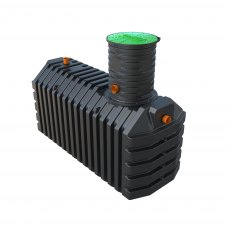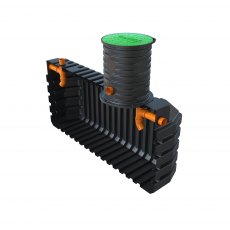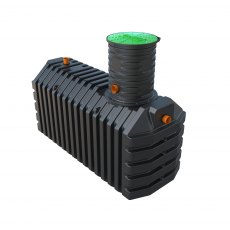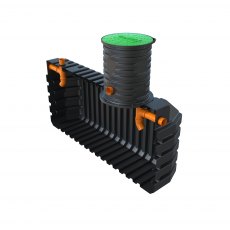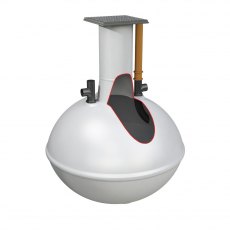Septic Tank Regulations: Everything You Need to Know

Under current Environment Agency septic tank regulations, by 2020 many septic tanks had to be upgraded to meet these new requirements. If you have a septic tank that discharges directly into a body of water (e.g. a river, ditch or stream), you are required by law to replace or upgrade your sewage treatment system as soon as possible, or when you sell the property.
What is a septic tank?
A septic tank provides a traditional solution to sewage disposal needs for domestic dwellings without access to mains drainage. Installed underground, a septic tank makes use of natural processes to treat the sewage it stores. It is an underground wastewater chamber, that’s been designed to settle and retain solids from a property, which sinks to the bottom of the septic tank and the liquid flows out and soaks through to the ground.
How does the septic tank system work?
- Wastewater from your toilets, sinks, showers and household appliances drain into your septic tank.
- Sewage solids are retained in the septic tank where beneficial bacteria digests the sewage.
- The resulting sludge needs to be removed regularly by a registered contractor.
- Liquid effluent containing bacteria, phosphates and nitrates flows out of the tank into your either your percolation tank or percolation are and on into the ground soak away area.
Who Is Responsible for septic tanks?
If you are an owner or occupier of a property that has a septic tank, then it is responsibility to ensure that it complies with the most-up-to-date government guideline, and it is repaired when needed.
In conclusion
You as a homeowner are responsible for your choice, installation and maintenance of your wastewater system under a new code of practice introduced by the Environment Agency. You have a legal responsibility to minimise the impact of your sewage waste if you manage it within the bounds of your property e.g. with a septic tank or sewage treatment.
If you need some advice whether you need to upgrade your septic tank system and the next steps to take, we are happy to help.
Our recommended Septic Tanks
Septic Tank Regulations
As of May 2025, Ireland has updated its septic tank regulations to enhance environmental protection and public health. Here's a comprehensive overview:
Registration Requirements
-
Mandatory Registration: All domestic wastewater treatment systems, including septic tanks, must be registered with your local authority.
-
Registration Fee: A one-time fee of €50 applies.
-
Registration Process: You can register online at Protect Our Water or in person at your local authority office.
-
Legal Obligation: Failure to register is an offence and may result in a fine of up to €5,000.
Inspections and Compliance
-
Inspection Program: Local authorities conduct inspections under the EPA's National Inspection Plan to ensure systems do not pose risks to human health or the environment.
-
Inspection Criteria: Inspections focus on system maintenance, signs of leakage, and potential contamination of water sources.
-
Advisory Notices: If issues are found, an advisory notice will be issued outlining necessary remedial actions.
-
Recent Findings: In 2024, over half of the 1,400 septic tanks inspected failed to meet the required standards.
Enhanced Grant Schemes (Effective 2024)
-
Increased Funding: Grants for remediation, repair, or replacement of septic tanks have increased from €5,000 to €12,000.
-
Eligibility Expansion: The requirement to have registered your septic tank by 2013 has been removed, broadening eligibility.
-
Grant Schemes:
-
National Inspection Plan Grant: For systems identified during inspections.
-
Prioritised Areas for Action Grant: For systems in areas targeted under the River Basin Management Plan.
-
High Status Objective Catchment Areas Grant: For systems in environmentally sensitive areas.
-
Installation and Maintenance Standards
-
Code of Practice: All works must comply with the EPA's 2021 Code of Practice for Domestic Waste Water Treatment Systems.
-
System Design: Septic tanks should be at least 7 meters away from any dwelling and within 30 meters of an access point for emptying.
-
Maintenance: Regular de-sludging and servicing are essential to ensure proper functioning and compliance.
Health and Environmental Risks
-
Water Contamination: Faulty systems can contaminate drinking water sources with harmful bacteria and viruses.
-
Environmental Impact: Improperly treated wastewater can lead to nutrient pollution in rivers and lakes, affecting aquatic ecosystems.
Further Information and Assistance
-
Protect Our Water: www.protectourwater.ie – For registration and information.
-
Local Authorities: Contact your local council for inspections, grants, and compliance assistance.
-
Environmental Protection Agency (EPA): www.epa.ie – For guidelines and national inspection plans.

FAQ's About Septic Tanks
How to Discharge Waste from Septic Tanks
There are 3 options available:
(1) Connect to a main sewer if possible
(2) install a drainage field or
(3) install a sewage treatment plant which treats the wastewater, producing a clear overflow that is environmentally friendly and suitable for discharging.
View our full range of sewage treatment plants.
Why should I look after my septic tank system
If your septic tank system is not in good working order it can be a serious risk to both health and the environment. You also have a legal responsibility to maintain your septic tank system. In looking after your septic tank system, it will have to be emptied less frequently, saving you money. A septic tank system can also be costly to replace if it fails.
What checks should I make on my septic tank system?
If your septic tank system is in good working order you should have the following:
- Your household drainage should be quick to clear, and toilets should not be backing up
- There should be no smell from your tank and the cover should be accessible and well fitting
- The soak away should be dry not swampy, smelly or have prolific grass growth
- A pale liquid with little or no smell should come from the discharge pipe. It should not be dark, smelly or contain solids
- Makes sure to keep deep-rooted trees and plants at least 30 m away from your system. Keep the grass nearby short.
If any of the above is showing signs that your septic tank system is not in proper working order, you must get it repaired or replaced by a credited installer.
How often should I empty my septic tank?
Your tank should be emptied once a year so that you do not risk a build up of sludge which can lead to problems with your system. The company you use to empty your septic tank must be registered to do so.
Do I need to register my tank?
Yes you need to register your septic tank with your Local Authority – click here to register https://www.protectourwater.ie/. There is a charge of €50 to register.
Is the landlord responsible for emptying the septic tank?
If you own a property which you rent, or you are a tenant yourself, it can become a little less clear who has the responsibility to empty the septic tank. Maintenance and responsibility can be written into the tenancy agreement. If you are a landlord renting out a property with a septic tank you may need to put measures in place if you want the tenant to take responsibility for the septic tank. You may need an inspection or service after the end of any tenancy period. As a tenant, if it is written into the tenancy agreement that you have responsibility for the septic tank, you might also want to insist upon an inspection to ensure you aren’t inheriting any issues you would then be liable to pay for is one way to do this. Checking the schedule of maintenance and the obligations is another before any serious issues can occur. Following the guidelines of the septic tank is important too.
Do septic tanks need servicing?
You should have your septic tank system regularly maintained in accordance with the manufacturer’s instructions. If these are not available, ask your local maintenance company for advice. This will save costly repairs or replacement of the sewage system in the long term.
Does my septic tank need a permit?
Owners of properties connected to larger on-site systems where the discharge is in excess of 5 cubic metres per day do not need to register (i.e sports clubs, pubs, hotels, guesthouses and other businesses). Instead such systems may require a licence from the relevant local authority under Section 4 of the Water Pollution Act 1997.
How far should my septic tank be from the house?
Septic tanks should be at least 7 metres away from any dwelling. They should also be located within 30 metres of an access point so that the tank can be emptied.
What are some things that should not be put into the septic tank system?
- Don’t flush anything other than bodily waste and toilet paper down the toilet
- Don’t dispose of grease or oil down any drain – wipe out pans and pour fat into a container to be disposed of in the bin
- Don’t put paints, solvents or chemicals down the drain
- Don’t try to unblock pipes with caustic soda or drain cleaners. Try boiling water instead
- Don’t connect rainwater pipes to your septic tank
What are your options when it comes to the Septic Tank Regulations
If your current system discharges directly into a water course, you will need to upgrade your system. To go through your options give us a call, and we can talk you through the various options.
Find out more about our sewage treatment systems here
If you are in the UK and are looking for a septic tank please click Tanks Direct.

Septic Tank or Sewage Treatment Plant?

Navigating Septic Tank Grants in Ireland

 Login
Login
